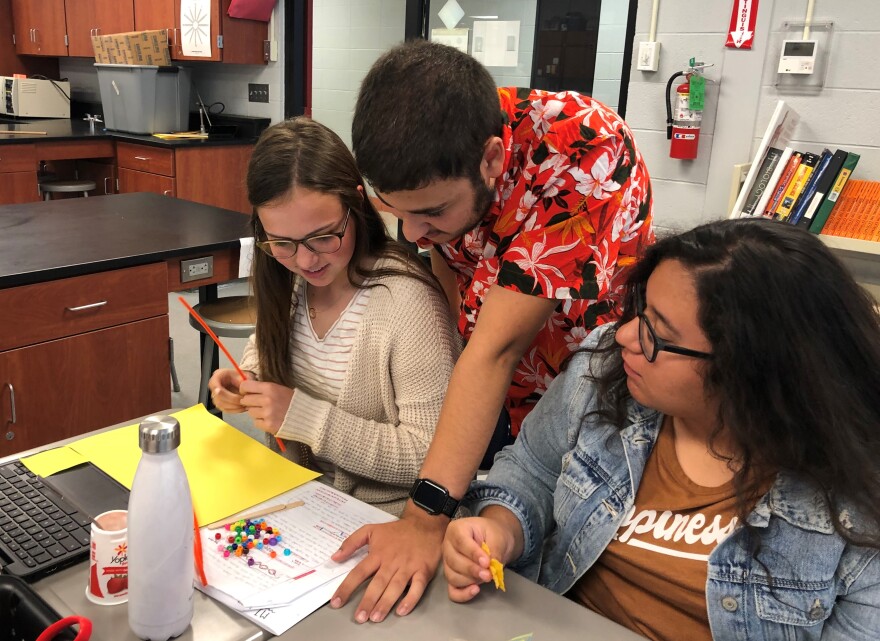With college costs rising every year, Missouri’s A+ Scholarship Program is a bargain – 50 hours of tutoring in exchange for two free years of community college.
College access advocates, however, argue that the money isn’t going to the students who need it most.
“We know there are people who utilize A+ who come from families that make $100,000 or $200,000 a year,” said Karissa Anderson, the advocacy director for the Scholarship Foundation of St. Louis.
The program doesn’t look at financial need, instead only considering whether students meet tutoring, attendance and academic requirements. It provides a full ride for two-year schools but cuts that if the student receives other need-based financial aid.
Often the biggest winners are students who go to big high schools in fairly rural areas – high schools like Fort Osage in Eastern Independence, where more than a third of 2018 graduates successfully completed the A+ program.
‘Why not do it?’
The rules are simple.
“Come to school on time, be here every day, make decent grades ... and the state will reward you with some financial compensation to go to college,” said Fort Osage High School Principal Scott Moore.
It’s A+ coordinator Patti Horner’s job to shepherd Fort Osage students through the process. Even if a student plans to go to a four-year college, she really encourages them to do A+.
“I feel like most of the students who are college-bound have a four-year degree in mind,” Horner explained. “The ones who end up at community college, it’s for financial reasons.”
As a result, a lot of A+ students at Fort Osage aren’t even sure if they’ll use their scholarship, including Aubri Stewart. Stewart is only a junior, but she’s already knocked out her tutoring hours, helping soon-to-be Fort Osage students at kindergarten camp.
“I watched a lot of lightning shoes ... they were super excited about their new shoes. I blew a lot of noses, wiped a lot of messes,” Stewart said.

Involved in band, theater and choir, Stewart dreams of performing for a living someday, and she knows she wants to get a bachelor’s degree. But if money’s tight, she’ll be able to use her A+ scholarship at a Missouri community college, then transfer to a four-year school.
“I just wanted to have that opportunity. I don't know if I will use my A+ scholarship, but to have the opportunity to do two free years of college? Why not do it?” Stewart said.
By the numbers, it’s clear that A+ is a backup plan for many Fort Osage recipients. Just 61 of the class of 2018 A+ graduates actually enrolled at a community college. Almost as many went straight to four-year schools, some of which offer partial scholarships to A+ students, but not all.
Factoring in financial aid
Three of the five high schools with the most A+ graduates – Nixa, Kickapoo and Ozark – are in the greater Springfield area. The other two, Washington and Seckman, are outside of the St. Louis metro.
But college access advocates tend to point to more affluent suburban districts in their critiques of the A+ program. Also near the top of the list are the solidly middle-class Francis Howell, Lee’s Summit and Liberty school districts.
“The suburban schools, their counselors have more time to do this sort of thing,” said Scott Baier with St. Louis-based College Bound, a program that helps urban teens get to and through college, “and they're assessing their students when they're freshmen and sophomores in terms of what their post-graduate path is.”
That’s certainly true in Fort Osage, where Horner wants every student to have a plan and a backup plan. But Principal Moore thinks his district has a lot more in common with rural school districts where college isn’t a given than it does some of its suburban neighbors.
“To some, I think college is perceived as an unattainable goal in all sincerity because I think being in this rural community, that's the mindset,” Moore said. “The financial compensation is huge. If you can talk to families early enough about the potential, they can see college as a possible future for their student.”
Some of those same attitudes about higher education persist in urban schools, too. Yet very low-income students don’t often participate in the A+ program.
“It’s probably a factor of time,” Baier said. “Our students that would be eligible are probably going to be getting full rides to community college.”
It’s not that the low-income students College Bound works with can’t meet the requirements of A+, Baier said. It’s that they already qualify for Pell Grants, and the state of Missouri requires students to use up any federal aid before applying A+ funds. So it doesn’t make much sense for really low-income students to spend their time checking all the boxes.
Anderson, the college access advocate, said as long as A+ is a “last dollar” scholarship, the money will always flow to middle-income students. She isn’t sure that makes sense in a state that’s made deep cuts to its higher education budget over the last decade.
“If we thought about college-going as a state, as a culture, we could probably come up with a program that will benefit both the folks in the urban areas and the folks in the rural areas who all need access to some type of schooling that will set them up for the future,” she said.
Elle Moxley covers education for KCUR. You can reach her on Twitter @ellemoxley .
Copyright 2020 KCUR 89.3. To see more, visit KCUR 89.3. 9(MDA1MjI2NzUxMDEyNzQyMTY5MjQ2YzkwNA004))

